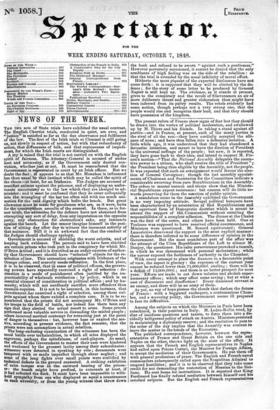NEWS OF THE WEEK.
THE two sets of State trials have exhibited the usual contrast. The English Chartist trials, conducted in quiet, are over, and THE two sets of State trials have exhibited the usual contrast. The English Chartist trials, conducted in quiet, are over, and
"justice" is satisfied so far as the due observance and fulfilment of the law. The first of the Irish trials at Clonmel is still going on, not slowly in respect of action, but with that redundancy of action, that diffuseness of talk, and that copiousness of impedi- ment, for which the Irish courts are distinguished. A cry is raised that the trial is not carried on with the English spirit of fairness. The Attorney-General is accused of undue heat and animosity, as if the Government only desired con- viction, whether just or not. It must be remembered that the Government is represented in court by an Irish officer. But we doubt the fact: it appears to us that Mr. Monahan is influenced less than usual liy that instinct which may be called the spirit of the chace—at least, for an Irishman. The Judges are accused of manifest, animus against the prisoner, and of displaying an unfor- tunate uncertainty as to the law which they are charged to ad- minister: and it must be confessed that they do enter colloquially into the wrangling. of the bar too often and with too much ani- mation for the cold dignity which befits the bench. But great allowance must be made for gentlemen who are, as it were, butts for the unschiphlous assaults of the counsel. In these, as in for- mer trials, the advocates for the defence have not abstained from attempting any sort of delay, from any imputation on the opposite party, any obstruction for obstruction's sake, any innuendo against the bench. Let the censor imagine himself in the posi- tion of sitting day after day to witness the incessant activity of that nuisance. Still it is an awkward fact that the conduct of the Judges should challenge apology.
Government is accused of shielding the worst culprits, and of keeping back evidence. The persons said to have been shielded are certain priests who took part in the conspiracy for which Mr. O'Brien is tried ; and it is described as an unfair exercise of author- ity that Government should have "selected" objects for the re- tribution of law. This accusation originates with Irishmen of the Orange colour, and scarcely needs refutation. In the first place, it is to be observed, that in cases of political offence, the govern- ing powers have repeatedly exercised a right of selection : de- cimation is a mode of punishment often justified by the im- practicability of wholesale retribution ; by policy, which is an essential element of consideration in political affairs ; and by hu- manity, which will not needlessly sacrifice more offenders than example requires. It is not to be assumed, in this instance, that Government has exercised a right of selection, among those cul- prits against whom there existed a complete case. It is to be re- membered that the priests did not accompany Mr. O'Brien and his troops to the field of battle, nor indeed has there been any sign that they abetted the actual resort to arms. Some priests performed most valuable service in dissuading the misled people ; others incurred merited contempt for retracting just at the point of danger to themselves : but, however base or exalted the mo- tive, according to present evidence, the fact remains, that the priests were not accomplices in actual rebellion.
The long-enduring examination of the witnesses has been the usual battle over technicalities, in which all sides displayed the eagerness, perhaps the spitefulness, of card-players. As usual, the efforts of the Government to master their case were hindered and weakened by the grossest laxity among their subordinates : witnesses were detected in speaking by rote ; documents were tampered with or made imperfect through sheer neglect ; and some of the long fights over small points were stultified by technical defects in the ground contested. A striking exhibition of calm temper was in the outward bearing of the prison- er: the bench might have profited, in externals at least, if it had reflected the dock. It must have been impossible to with- hold sympathy from one who displayed so equal a countenance in such adversity, or from the young witness that threw down the book and refused to be sworn "against such a gentleman." However perversely occasioned, it cannot be denied that the only semblance of high feeling was on the side of the rebellion : so that the trial is attended by the usual infelicity of moral effect. Hitherto the most piquant of the expected disclosures have not come forth : it is supposed that they will be elicited by the de- fence ; for the story of some letter to be produced by General Napier is still kept up. The evidence, as it stands at present, gives to the conspiracy and the revolt of Slievanamon an air of more deliberate intent and greater elaboration than might have been inferred from its paltry results. The rebels evidently had some notion, though perhaps not a very strong one, that the people would rise and recognize their lead, and that they should have possession of the kingdom.


























